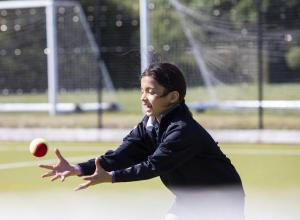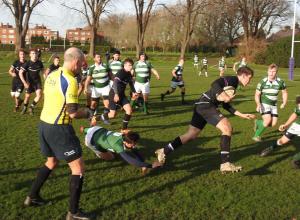
In his first Maths Mastery Blog of the year, Warren Rodricks argues that the change to mixed ability Mathematics groups has had real benefits for all Lower Prep pupils
‘Change is the only constant in life,’ wrote the Greek philosopher Heraclitus more than 2500 years ago. As we come together as a school for the first time in what feels like a very long time, his words, still have an enduring relevance. In today’s ‘new normal’, it certainly feels that change will be a focal point of our lives for the foreseeable future.
This blog is about change of a rather specific kind that we are making to 8s and 9s Maths education at Harrodian, namely to teach those early years in mixed ability groups. Mixed ability teaching has always been a hotly debated topic so, as with all change, some will embrace it, others...not so much. So, what I plan to do with this blog and the next few is to set out why we think this change makes sense for Harrodian’s youngest learners.
One factor to bear in mind is the change that the pandemic has imposed on the school. As you know, to protect the students, we have created ‘bubbles’ at Harrodian and this has inevitably reduced the number of Maths groups we are running this year. This change has involved re-thinking our structures but it is not the most important factor in thinking about re-sculpting the experiences of our students. The theory and practice of Maths mastery has been much more important than our current 'bubbles' in driving the shift to Mixed Ability teaching.
The theory and practice of Maths mastery has been much more important than our current 'bubbles' in driving the shift to Mixed Ability teaching.
Our approach to mastery is influenced by two main schools of thought. One from Singapore, the other from Shanghai. One of the most interesting things about the development of mastery within these two systems is that they are both based on mixed ability classes. In fact, Singapore classrooms are usually made up of 40 students with only a single teacher and no teaching assistant. What’s more, Singapore teachers are generalists, not mathematical specialists. The question that rises then, is why does mastery work so well in this type of setting?
First and foremost is the concept of communication. Mastery asks students to talk to each other, to collaborate, to disagree, to explain. The need to communicate mathematically is an imperative for students to master a concept. Much of this time this type of communication comes naturally to the more confident and able students in a class. But, it is vital that every child takes part in these discussions both in a small group and as part the whole class.
Sometimes though, children lack the vocabulary and understanding required to initiate the discussion and this is part of why mixed groupings are so important. In these environments, children have their peers as role models and get to see first hand the way other students consider and process a concept.
In Mixed Ability environments, children have their peers as role models and get to see first hand the way other students consider and process a concept.
Some argue that this process only helps the weaker students as they gain from hearing mathematical dialogue which they would not necessarily hear in an ‘ability’ set. In fact, such conversations also benefit more able students as well. They are asked to explain their ideas and the concepts being studied and, through this, they gain a deeper understanding of the concept themselves. The logic is simple, being able to explain something so that someone else understands it requires a deep level of understanding in itself; it also means students often get to experience both being the ‘teacher’ and the ‘student’ with their peers and as a result their own understanding improves. Two heads are better than one is certainly true when developing a depth of understanding.
A second key to the success of mixed ability classes work is ‘pitch’. The pitch of all lessons is based on the required curriculum; it requires stronger mathematicians to keep on rising to the challenge, to keep on delving into their thought process in order to solve various problems. The wonderful thing about this is that those who struggle with Maths are being asked to do the same.
Some students require more support than others, but they are all expected to work within the same curriculum band and to tussle with complex problems.
One of the troubling aspects of differentiation (providing different work for different abilities) is that in the past it was used to ‘water-down’ curriculum expectations and in turn created greater distances between the most able and least able mathematicians in a class. Under mastery, the expectation is that all students will learn the core curriculum because it is what they deserve. High pitch, high expectations, high hopes.
The third piece in our mixed ability jigsaw is enrichment, sometimes known as ‘extension’. In the past, it was common to accelerate a student to the next year group’s curriculum as a way of challenging them. Mastery does not do this. Instead it enriches a student’s understanding by providing opportunities to deepen their understanding. When pupils finish their work quickly we don’t ask them to just wait quietly for others to finish. Instead we have enrichment activities which vary by topic and year group, but which always provide a new challenge for those who complete their work before their peers.
When pupils finish their work quickly we don’t ask them to just wait quietly for others to finish. Instead we have enrichment activities which always provide a new challenge
Looking back at the classes I have taught through my career it is clear to me that I have always needed to teach a range of abilities. Even in ability sets, what students know and understand still varies so we use the ideas set out here to ensure all students get the challenges they need. That’s why making the change to mixed ability groups with our younger pupils is something we welcome. The opportunity to create deeper dialogue for all of our students is the ultimate goal and one that will lead them to truly mastering their Mathematics.
Mr Rodricks welcomes feedback on this blog to website@harrodian.com







